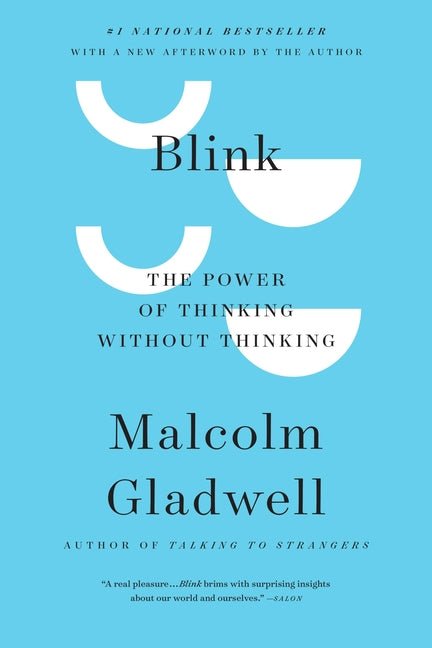Blink: The Power of Thinking Without Thinking
by Malcolm Gladwell
*When you open this audiobook on Libro.fm, be sure to select Aveson as your bookstore so that your purchase supports local literacy programs and tree‑planting.
Couldn't load pickup availability
From the #1 bestselling author of The Bomber Mafia, the landmark book that has revolutionized the way we understand leadership and decision making.
In his breakthrough bestseller The Tipping Point, Malcolm Gladwell redefined how we understand the world around us. Now, in Blink, he revolutionizes the way we understand the world within.
Blink is a book about how we think without thinking, about choices that seem to be made in an instant--in the blink of an eye--that actually aren't as simple as they seem. Why are some people brilliant decision makers, while others are consistently inept? Why do some people follow their instincts and win, while others end up stumbling into error? How do our brains really work--in the office, in the classroom, in the kitchen, and in the bedroom? And why are the best decisions often those that are impossible to explain to others? In Blink we meet the psychologist who has learned to predict whether a marriage will last, based on a few minutes of observing a couple; the tennis coach who knows when a player will double-fault before the racket even makes contact with the ball; the antiquities experts who recognize a fake at a glance. Here, too, are great failures of "blink" the election of Warren Harding; "New Coke"; and the shooting of Amadou Diallo by police. Blink reveals that great decision makers aren't those who process the most information or spend the most time deliberating, but those who have perfected the art of "thin-slicing"--filtering the very few factors that matter from an overwhelming number of variables.
Share
Book Details
ISBN:
9780316172325
EAN:
9780316172325
Binding:
Hardcover
Pages:
288
Authors:
Malcolm Gladwell
Publisher:
Little Brown and Company


I often hear an interview with an author or read a review of a book that sounds terrific, only to learn when I read the book that I learned about all I need to know from the interview or review. Unfortunately BLINK fits that category although Mr. Gladwell does make some interesting observations that fall into the sad, the fascinating and the obvious. It is sad, for instance, that in the year 2005 we are still programmed by racial stereotypes when we blink. The shooting of Amadou Diallo is an unfortunate example. Police officers see a small black man on the street after midnight in a bad neighborhood in the Bronx. When they drive by him he does not run. Then he finally runs, attempting to get into his apartment and reaches for somethig that turns out to be a billfold. We know how this incident ended. Mr. Gladwell goes into great detail to explain all the mistakes that the polices officers made. For instance, if they had paid attention to his face they would have seen that he was frightened rather than dangerous. It is incredibly sad that in an experiment where black college students, when given twenty questions taken from the GRE, the standardized test for admission to graduate school, if asked to state their race on a pretest questionnaire, the number of questions they would get correct is cut in half, they are so programmed by negative racial stereotypes. (Congressman John Lewis has spoken out recently on racial profiling at airports.) Some of Mr. Gladwell's facts are fascinating. Shoppers will pay more for the same amount of ice cream if it is packaged in a round rather than a rectangular container, for instance. Then there is the Pepsi v. Coke taste test. Fanatics swear they can tell the difference, and many drinkers can. However, if you do the triangle test, where you put the same cola in two glasses and the other in the third glass and ask a thousand samplers to tell you which two colas are the same, only about a third of the testers gets it right. That, according to the author, is not much better than chance, so we might as well guess. Many of the author's observations and conclusions are obvious: what he calls the Warren Harding error-- that we often vote for attractive political candidates regardless of their qualifications; and that tall white men get promoted over black men, white women, black women and short white men; and that blinking or "thin slicing" is more accurate if it involves something we care about and are good at, i.e., we have experience in the area. He gives example after example of this: the psychologist who through years of study can predict from a short interview with a young couple- even if they are just discussing a pet-- if they will get a divorce down the road; the art critic who spotted an expensive fake immediately because she had studied ancient sculptures, the seasoned tennis pro who can predict when tennis players will miss their second serve. The Seventeenth Century philosopher Pascal is way ahead of Mr. Gladwell since he said something similar a long time ago: chance favors the prepared mind.
it is a little slow going as most awareness books are, but explains process of intuition in earning
Written in a format similar to his other books, this one does not disappoint.
A well researched, cogent argument about how experience matters. There’s not much that I can say about this book that the New York Times has not already said, or that somebody paid Kirk’s Review to say for them.
I have seen a number of Mr. Gladwell’s interviews and read a few articles. I knew that I appreciated his way of thinking. When I was reading a book that referenced Blink I thought it was about time. It was all I thought it would be and more.



